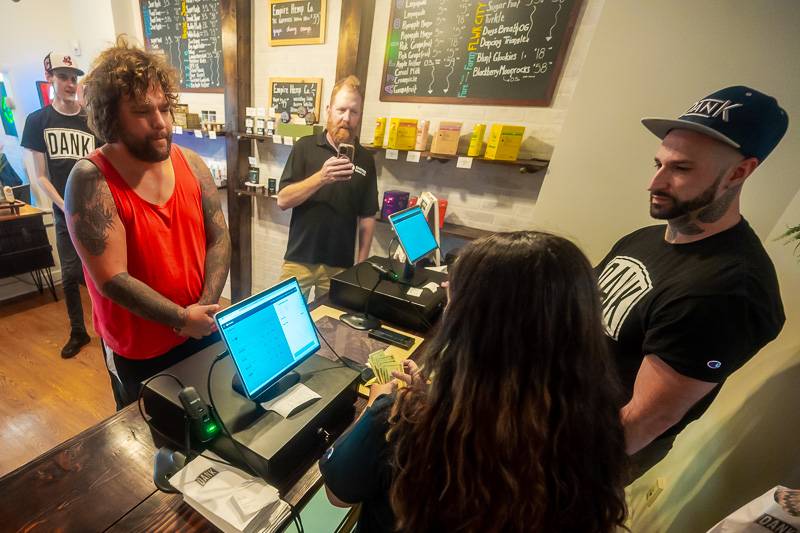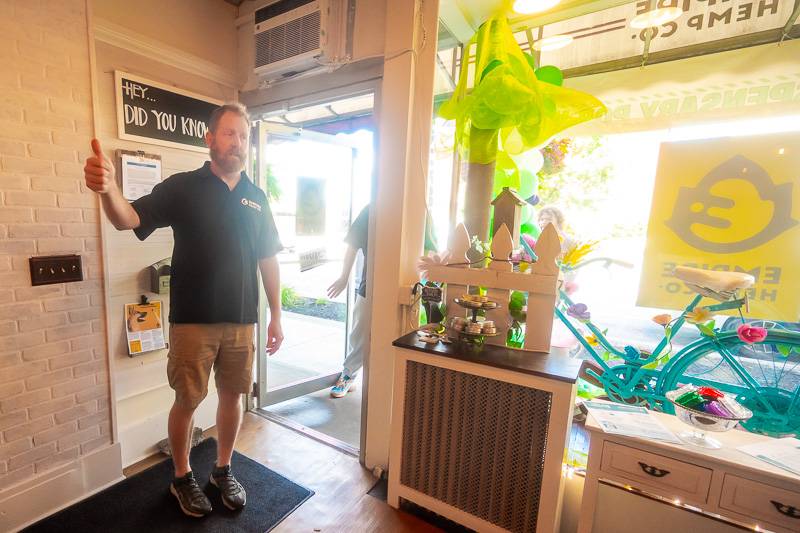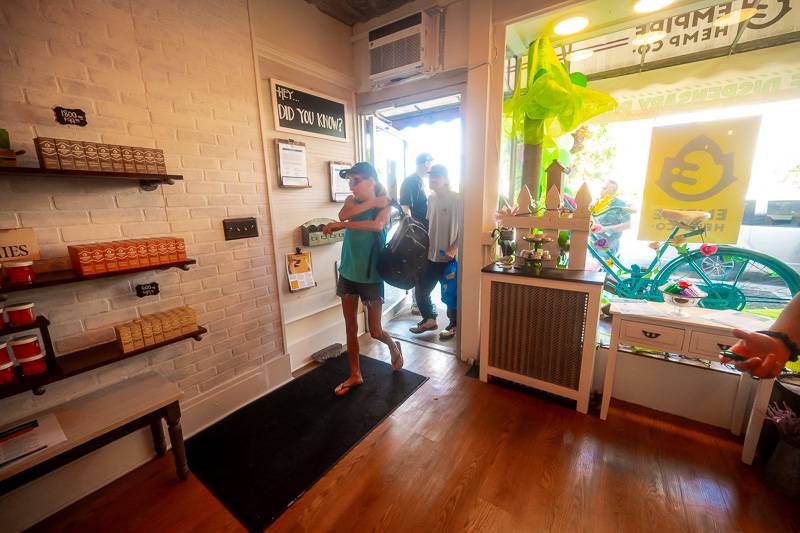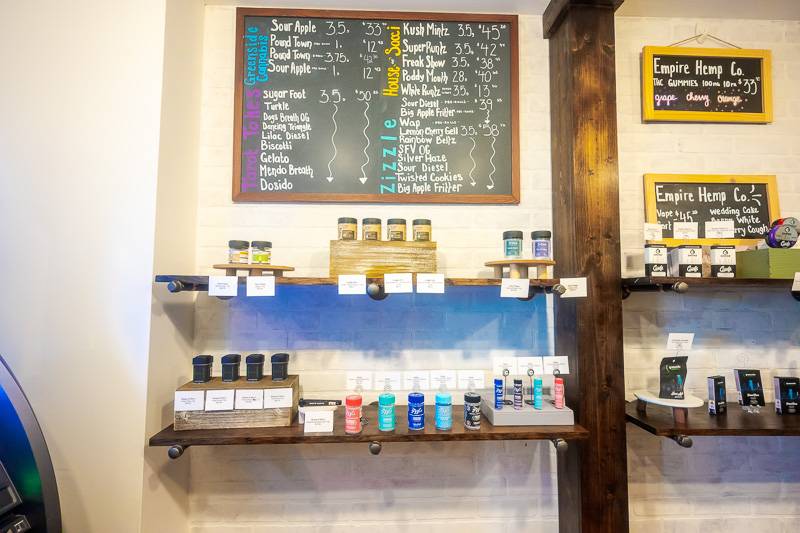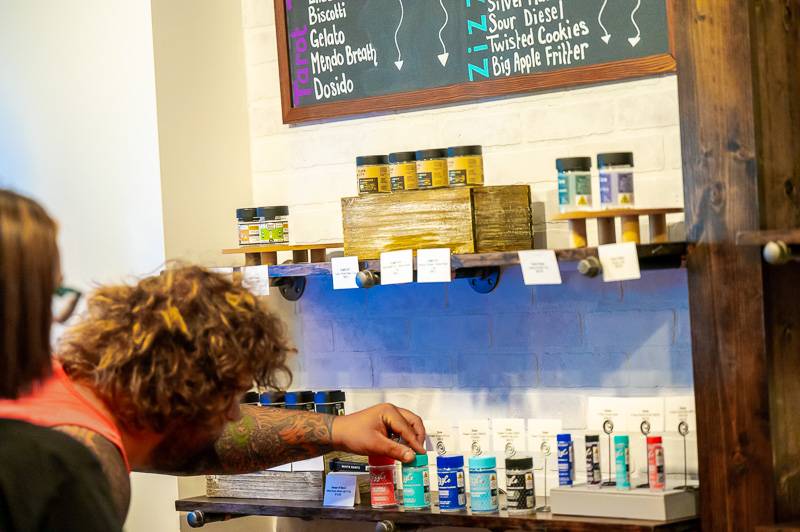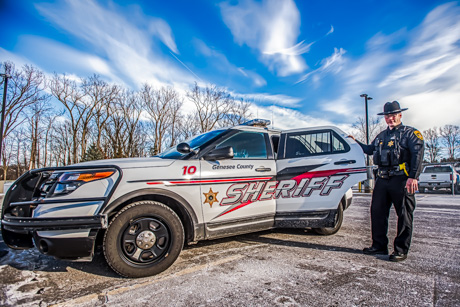Chief Shawn Heubusch and Sheriff William Sheron at a Public Service Committee meeting in January.
Rather than a potential revenue windfall, marijuana legalization could drive up costs for county government, County Manager Jay Gsell warns, as the county will need to cope with several matters related to law enforcement, public health, and federal contracts.
He's concerned state officials pushing for legalization haven't fully thought through these issues.
"I see it mostly as there could be more negative cost implications to the county as far as what we'll be dealing with in terms of our social service agencies or treatment agencies, and the related people that are part of what we fund in county government, such as law enforcement, and the public health considerations, rather than, 'oh, I see this as just another nice thing to do -- a little bit of a revenue stream,' " Gsell said. "I just don't even see that happening per se."
State officials are talking about implementing a 2 percent or 4 percent sales tax on marijuana sales and remitting some portion of that tax to local jurisdictions that don't opt out of permitting sales.
Gsell said since consumption will be legal in all counties in the state, opting out of allowing local sales will really be just turning down whatever revenue a county might be able to recoup for the potential increase in expenses that go with legal pot.
Both Sheriff William Sheron and Batavia Police Chief Shawn Heubusch have publicly opposed legalization of marijuana, expressing concern about the potential for more highway fatalities, easier access to cannabis for teens, and the potential for increased crimes. Last month they shared these concerns with the county's Public Service Committee.
"The public safety issue is really what has law enforcement against it," Sheron said.
Both top cops have sent out press releases generated by their respective state law enforcement associations opposing legalized marijuana. In both cases, the Sheriff and the Police Chief say that marijuana-related traffic deaths have increased in Colorado since recreational use of cannabis became legal.
However, various reports available online contradict this assertion.
The Colorado Springs Gazette reported last summer that while the number of fatal accidents where some trace of marijuana was present in one or more of the drivers involved had increased, fatalities in accidents where a driver was considered impaired by marijuana dropped significantly, from 52 in 2016 to 35 in 2017.
The Reason Foundation compiled a comprehensive report on driving and marijuana use that also suggested there is little correlation between legalized marijuana and increased traffic fatalities. Reason also found some data to suggest that legalized marijuana helps reduce drunken driving fatalities either because people consume less alcohol or since states like Colorado ban public consumption of marijuana, people who mix alcohol and marijuana are more likely to do so at home.
On the law enforcement front, a report from Police Quarterly, cited in a story from the Seattle Times, said that legalized marijuana seems to correlate to high clearance rates (cases solved) for reported crimes as officers spend less time on drug offenses.
It might surprise some that Jeremy Almeter, owner of Glass Roots on Center Street, isn't exactly eager to start selling marijuana from his shop, should it become legal. But he does support legalization and takes issue with opponents who say marijuana will lead to more traffic accidents or that it's some sort of gateway drug.
"I've been hearing marijuana is a gateway drugs since I was a kid, and I can tell you that the only true gateway drug in our society right now is alcohol," Almeter said. "You know, nobody smokes a joint and then goes out and decides to rob a liquor store. Bad decisions are made by people when they're inebriated.
"You know they're making decisions that they wouldn't normally make. I have seen, firsthand, the effect of alcohol on people doing exactly that. I think marijuana is one of the safest plants on the planet. I think hemp is right in the same plant family and they both deserve access for every person on the planet.
"If they if they're helping you, great, but they've never killed anyone. How many people are we losing a year to drunken driving?"
Almeter added, "Alcohol kills 88,000 people a year. Cigarettes kill 480,000. Cannabis has never killed anybody."
Whether marijuana has ever killed anyone is a disputed assertion. Here's Politifact on the topic.
Dealing with drivers who are so high their ability is impaired, regardless of what the statistics out of Colorado and elsewhere say, is a major concern for both Sheron and Heubusch. The chemical test for driving under the influence of alcohol is pretty straightforward. Blood alcohol content is scientific, objective and reliable. Busting a driver impaired by marijuana is more of a judgment call, and getting such a charge to stick in court requires officers who are trained as drug recognition experts.
It's an expensive proposition to have a DRE on a department's force. The Sheriff's Office has six currently. Batavia PD, only two.
It takes an experienced officer six months of training before obtaining DRE certification.
"In the law enforcement realm, the DRE program is one of the most difficult and time-consuming certifications that you can obtain," said Undersheriff Bradley Mazur.
During a recent interview, Deputy Ryan DeLong (top photo), who is DRE certified, discussed the process involved in making an arrest of a driver suspected of driving while impaired by a drug.
First, there needs to be probable cause to make a traffic stop. Second, the officer must observe something about the driver that indicates he or she is either high or intoxicated. Then the officer can initiate a field sobriety test.
If the officer isn't DRE certified but has a good reason to believe the driver is impaired by marijuana or another drug, then the officer will require the assistance of a DRE officer.
"The first thing that we do really doesn't change and that's just the administration of standardized field sobriety testing," DeLong said. "At the roadside, we're doing the battery of tests -- horizontal nystagmus (follow a pen with your eyes), walk and turn, and the one-legged stand. If we determine that the person is intoxicated or impaired by drugs, we take them into custody and start the process of bringing in a drug recognition expert. The drug recognition expert's job is to do three things: Determine is a person impaired? Is the impairment a medical impairment or a drug-induced impairment? And what category of drug or drugs is a person under the influence of, and how the DRE determines that is a 12-step process."
The process involves question, observation, and chemical testing (and those results can take some time to come back from the lab).
"What we're looking for, is there an abnormal dilation of the pupil for the lighting conditions or an abnormal constriction of the pupil and also how the pupil will react to a light stimulus," DeLong said. "We're looking at their muscle tone. We're going to check to see where it's most rigid or flaccid. We're checking for any injection sites for intravenous drug use throughout this whole process, and also just conducting an interview as we're interacting with the person.
"We're looking for observable signs of a drug usage such as somebody being on the nod, as we call it, where they're basically falling asleep in front of us, or different body tremors, or different signs of impairment. If we determine that this person is under the influence of a drug and what category of drug they are under, they'll go for a blood test or spittle test and (depending on the results) they'll be charged accordingly."
When it comes to law enforcement, marijuana legalization and the correlating expenses, the potential need for more DREs, aren't the only concerns for the county.
The Sheriff's Office has two new K-9s coming into service and of course, today's K-9s are trained to detect marijuana. That's a skill a K-9 won't unlearn, so there is some question about whether weed-sniffing dogs can remain in service.
Gsell is also worried about how legalization might impact Federal grants. The county receives more than $11 million a year from the Federal government and many of those contracts are contingent on the county maintaining a drug-free environment. Even if the state decriminalizes cannabis, that won't change Federal law or policy.
"As far as where federal money is used to fund positions and things of that nature, we have to provide assurances, like we do with our CDL drivers at the County Highway Department, that there are random drug tests done and there is a zero tolerance with regard to persons having any of that stuff in their systems," Gsell said.
While the state is promising an increase in revenue if marijuana sales become legal, a share of that revenue will only be available to counties that don't opt-out of legal pot sales within their borders. Given the anticipated increase in expenses, Gsell suggested the county will have little choice to allow local sales even if the additional revenue doesn't totally offset the additional expenses.
"The prospect of revenue or increased revenue is an ephemeral situation at this point," Gsell said. "There's no way to predict what that is and the things that we see from the state are not what I would call vetted enough, nor necessarily what I believe is actually going to come to reality."
